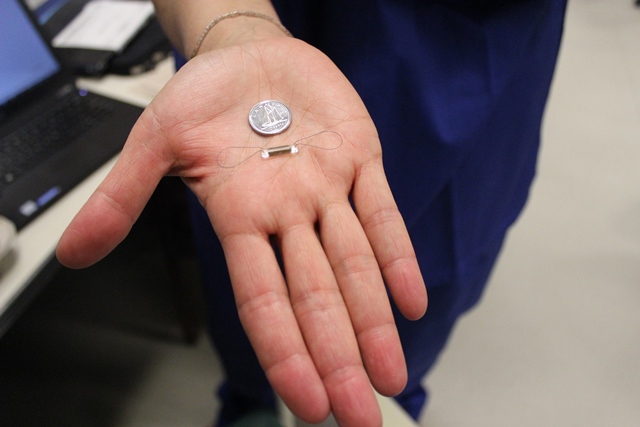
By Lianne Castelino and Erica Ngao
In a Canadian first, an interventional cardiology team at the Peter Munk Cardiac Centre (PMCC), in collaboration with the Ted Rogers Centre for Heart Research (TRCHR), has implanted a wireless device inside a heart failure patient, enabling clinicians to proactively monitor a patient’s cardiovascular status—virtually and in real-time—with the goal to reduce hospitalizations and re-admissions to hospital, improve quality of life and ultimately, survival.
The device called CardioMEMS HF System, developed by Abbott, was implanted in a 40-year-old male patient in March 2017 at PMCC.
Diagnosed with heart failure as a result of a heart attack in 2016, the patient, who did not want to be identified by name, underwent an angioplasty (a procedure to widen narrowed or obstructed arteries or veins) at PMCC last year, and was found to have left ventricular dysfunction, weakened heart muscle and coronary artery disease—the most common cause of heart failure.
“Heart failure is an epidemic that commonly leads to hospitalization,” says Dr. Heather Ross, scientific lead at the Ted Rogers Centre for Heart Research and cardiologist, Peter Munk Cardiac Centre.
“Hospitalization is often necessary when patients start to retain fluid, develop congestion and experience shortness of breath. This technology is a way to directly measure how much fluid is in a patient, allowing us to intervene before they develop symptoms of congestion, before they end up in hospital. This is a big game-changer,” says Dr. Ross.

The CardioMEMS HF System features a small butterfly-like sensor that is implanted, via a catheter-based procedure, into the pulmonary artery (which carries blood from the right ventricle of the heart to the lungs) of a heart failure patient. When the patient lies on an accompanying antenna-equipped pillow device, the sensor provides important data – including the patient’s lung pressure readings to clinicians – to a secure website.
“It’s going to give us invasive data that we can’t get any other way apart from having the patient in the hospital and having an invasive test to get the information,” says Meredith Linghorne, Nurse Practitioner, Heart Failure, PMCC.
“This way we’re getting crucial information about how the patient is doing and we can get it while they’re at home. It will give us pulmonary artery pressure readings that we use to help decide how well someone with heart failure is doing from a volume perspective. If their pressure readings are very high, it suggests that they’re retaining fluid and we need to make adjustments to their medications,” she says.
The patient is the first among 25 to be fitted with the device over the next nine months. The device is designed for a specific group of heart failure patients—those in serious condition but who are not so ill that the technology can’t improve their outcome.
The device was the subject of the CHAMPION trial in the United States and has been approved by the Food and Drug Administration (FDA) in the U.S. Efforts are underway to seek approval for the device from Health Canada.
Lianne Castelino and Erica Ngao are communication officers at University Health Network.
ABOUT HEART FAILURE:
The most rapidly rising cardiovascular disease in Canada
1 million – Canadians diagnosed
26 million – Global heart failure patients
10 days – average length of hospital stay
1.4 million – total number of hospital stays in Canada for heart failure
2.1 – average life span of heart failure patient after diagnosis
$3 billion – cost to Canadian health-care system
25% – # of heart failure patients who return to hospital within 3 months
50% – heart failure patients who return to hospital within 6 months

